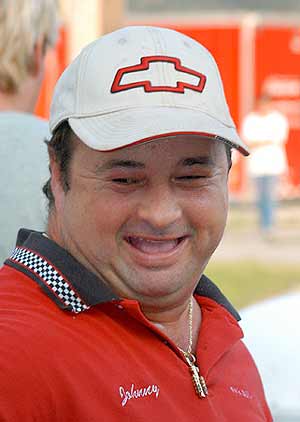| 
 
Is
the system working the way you expected?
Fenn: It’s
working as long as the tracks allow it to work,
as long as they don’t try to impose whatever
method they may have—good or bad—on
our Outlaw racers. It’s always better
for them to already know what they’re
supposed to do than for you to have to tell
them what to do. We’re also starting
to see the racers take care of it themselves,
too. They’re saying, “Hey, you’re
supposed to be out there and I’m running
behind you and I’m ready to go.”
 What
prompted you to establish a board of directors
for ORSCA? Why not just run it yourself without
dissenting opinions? What
prompted you to establish a board of directors
for ORSCA? Why not just run it yourself without
dissenting opinions?
Fenn: When
I formed the Outlaw Racing Street Car Association,
I always knew that I wanted to do that, that
we needed that. It was a plan right from the
start, I just didn’t know who to include.
It took running most of the year to figure
it out. Every one of the guys that I picked—and
I didn’t hold a vote or anything—I
hand-picked these guys. A few of them I didn’t
even personally know. Basically, these guys
are racers, car builders, track owners, and
just good people who care about the class.
 Who
are some of the guys on the board and what
made you choose them? Who
are some of the guys on the board and what
made you choose them?
Fenn: There
were a lot of reasons. I picked David Sheppard
because I see a lot of the cars he builds and
he pushes the envelope with every new car.
He can show me all the things that other car
builders can do that catch everybody in tech.
For a track owner, we’ve got Jeff Miles
at Carolina Dragway. Mainly because Jeff was
raised on a racetrack. I used to go to Carolina
Dragway way back when it was nothing like the
track it is now, and Jeff’s dad, Jeff
Miles Sr., showed him the proper way to treat
his racers and his fans. He gives his racers
and his fans every penny’s worth of their
money when they buy an entry or a ticket, every
time they come.
 Is
the board a permanent or semi-permanent group,
or something that you’ll arrange each
year? Is
the board a permanent or semi-permanent group,
or something that you’ll arrange each
year?
Fenn: Well,
I’ve tried to cover every class, but
of course, situations will occur that force
board members to come and go. We’re going
to keep it small, though. When you have a track
owner, two or three racers, and a car builder,
I think we’ve got the ground covered
for each class with someone who knows about
it.
 What
has surprised you the most about running a
series versus promoting a single race? What
has surprised you the most about running a
series versus promoting a single race?
Fenn: It’s
10 times harder. Make that 10,000 times harder.
When you have a points series, you’ve
got to be on your game, because you never want
to go into a race without the points from the
previous race being tallied. And you’ve
got to do the same things every time. Racers
are creatures of habit. As long as you do things
the same way every time you do them, pretty
soon you don’t have to explain what you’re
doing each time you get ready to do it. But
with these events now where you have to clear
near $40,000 just to break even, you’ve
got to have a show on both Saturday and Sunday.
You’ve got to have something for them
to see. If not, you’ve just got a test-and-tune
session, and those are maybe eight bucks to
watch. Outlaw races are 15 or 20 dollars a
head, and that’s why there has to be
a difference. It’s just business mathematics.

|